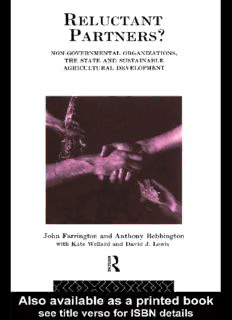
Reluctant Partners?: Non-Governmental Organizations, the State and Sustainable Agricultural Development (Non-Governmental Organizations) PDF
Preview Reluctant Partners?: Non-Governmental Organizations, the State and Sustainable Agricultural Development (Non-Governmental Organizations)
RELUCTANT PARTNERS? Insufficiencies and inequities in food production and supply in poor countries need to be addressed as problems of both agricultural resource management and rural democratization. Reluctant Partners? combines comprehensive empirical insights into NGOs’ work in agriculture with wider considerations of their relations with the state and their contribution to democratic pluralism. This overview volume for the Non-Governmental Organizations series contextualizes and synthesizes the case study material in the three regional volumes on Africa, Asia and Latin America, where over sixty specially commissioned case studies of farmer participatory approaches to agricultural innovation are presented. Specific questions are raised. How good/bad are NGOs at promoting technological innovation and addressing constraints to change in peasant agriculture? How effective are NGOs at strengthening grassroots/local organizations? How do/will donor pressures influence NGOs and their links to the state? John Farrington and Anthony Bebbington are Research Fellows with, and Kate Wellard and David J.Lewis are associates of the Overseas Development Institute. NON-GOVERNMENTAL ORGANIZATIONS SERIES Co-ordinated by the Overseas Development Institute The titles in the series are: RELUCTANT PARTNERS? Non-Governmental Organizations, the State and Sustainable Agricultural Development John Farrington and Anthony Bebbington with Kate Wellard and David J.Lewis NON-GOVERNMENTAL ORGANIZATIONS AND THE STATE IN LATIN AMERICA Rethinking Roles in Sustainable Agricultural Development Anthony Bebbington and Graham Thiele with Penelope Davies, Martin Prager and Hernando Riveros NON-GOVERNMENTAL ORGANIZATIONS AND THE STATE IN AFRICA Rethinking Roles in Sustainable Agricultural Development Edited by Kate Wellard and James G.Copestake NON-GOVERNMENTAL ORGANIZATIONS AND THE STATE IN ASIA Rethinking Roles in Sustainable Agricultural Development Edited by John Farrington and David J.Lewis with S. Satish and Aurea Miclat-Teves RELUCTANT PARTNERS? Non-governmental organizations, the state and sustainable agricultural development John Farrington and Anthony Bebbington with Kate Wellard and David J.Lewis London and New York First published 1993 by Routledge 11 New Fetter Lane This edition published in the Taylor & Francis e-Library, 2005. “To purchase your own copy of this or any of Taylor & Francis or Routledge’s collection of thousands of eBooks please go to www.eBookstore.tandf.co.uk.” Simultaneously published in the USA and Canada by Routledge 29 West 35th Street, New York, NY 10001 © 1993 Overseas Development Institute All rights reserved. No part of this book may be reprinted or reproduced or utilized in any form or by any electronic, mechanical, or other means, now known or hereafter invented, including photocopying and recording, or in any information storage or retrieval system, without permission in writing from the publishers. British Library Cataloguing in Publication Data A catalogue reference for this book is available from the British Library. Library of Congress Cataloging in Publication Data has been applied for. ISBN 0-203-97385-2 Master e-book ISBN ISBN 0-415-08843-7 Hbk ISBN 0-415-08844-5 Pbk CONTENTS List of figures viii List of tables ix List of boxes x Foreword xii Preface xv Acknowledgements xx Glossary xxii 1 INTRODUCTION: MANY ROADS LEAD TO NGOs 1 What are NGOs? 3 Rethinking the state 5 Civil society and self-managed development 12 High external input agricultural technology: spreading it and questioning it 15 Three broad motivations in the interest in NGOs 20 Questioning NGOs: what roles for the state? 21 Conclusion and summary 24 2 CONCEPTS FOR ANALYSING NGO-STATE RELATIONSHIPS 29 Introduction 29 Functional roles and institutional advantages in agricultural technology 30 development Institutions, histories and actors: NGOs between theory and relevance 41 Chapter summary 57 3 NGOs AND AGRICULTURAL CHANGE: TECHNOLOGIES, 61 MANAGEMENT PRACTICES AND RESEARCH METHODS Introduction 61 vi Some definitions 63 An overview and illustrative case studies of NGOs’ work in ATD 64 Characteristics of NGOs’ ‘alternative’ approaches to ATD 80 Conclusions 88 4 NGOs AND THE RURAL POOR: PATRONAGE, 93 PARTNERSHIP OR PARTICIPATION? Introduction 93 Identifying the rural poor and the causes of their poverty 94 NGO performance in reaching the poor—recent evidence 97 Perceiving a poverty alleviating role for NGOs 101 Reaching the poor in agricultural technology development—evidence from 103 the case studies Issues arising for NGOs, governments and funding agencies 116 Conclusions 122 5 RELUCTANT PARTNERSHIPS, HOSTILE 125 CONFRONTATIONS, OR PRODUCTIVE SYNERGIES? POSSIBILITIES FOR NGO-state INTERACTIONS A new dance floor? 126 Linkages between NGOs and NARS—a conceptual note 129 Technology paths and the division of tasks among NARS and NGOs in the 130 ATS Linkage mechanisms supporting institutional roles 138 Government-led linkages 159 Sequential linkages: NGOs innovate in the expectation of ‘scaling up’ by 164 government Collaboration and critique: incompatible strategies for scaling up? 170 Linkages between NGOs and the private commercial sector 172 Conclusions 175 6 WHERE FROM, WHERE AT, WHERE NEXT? 181 The case studies in context 182 vii Where from: the State and NGOs in context 182 Where at: NGOs and agricultural technology development 185 Where at: NGOs and other actors 187 Where next? theory and the future 193 References 201 Index 219 FIGURES 1.1 NGOs: diversity in the crowd 4 3.1 The technological foci and wider developmental contexts of NGOs’ 62 approaches to agricultural change 4.1 The depth and scope of NGO approaches to participation ATD 106 5.1 The differing characteristics of forms of interaction 130 TABLES 2.1 Functional strengths and weaknesses of NGOs and government in 39 agricultural technology development for the rural poor 3.1 Approaches to agricultural technology development in case study NGOs 67 4.1 Agricultural population projections in the case study countries 97 4.2 The performance of a sample of Latin American NGOs 99 5.1 Roles played by NARS and NGOs in the development of technology and 132 of methodologies 5.2 Structural and operational linkage mechanisms found in the case studies 140 5.3 Types of government-led interaction with NGOs 159
